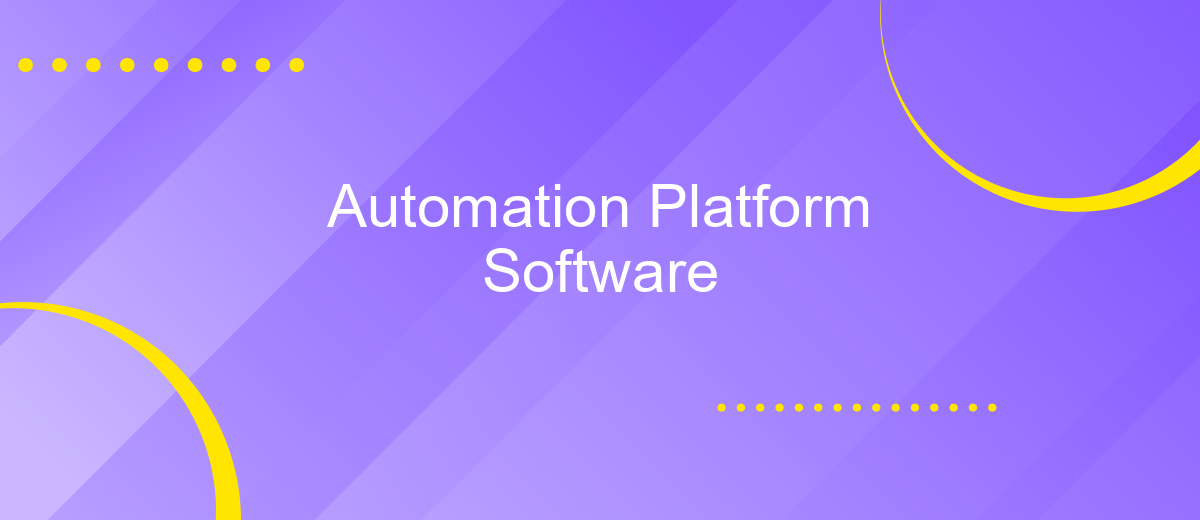Automation Platform Software
Automation platform software is revolutionizing the way businesses operate by streamlining processes and enhancing efficiency. These platforms offer a comprehensive suite of tools designed to automate repetitive tasks, reduce human error, and free up valuable resources for more strategic initiatives. As companies strive to remain competitive in an increasingly digital landscape, adopting automation solutions has become essential for driving growth and innovation across various industries.
Introduction
In today's rapidly evolving technological landscape, businesses are increasingly relying on automation platform software to streamline operations, enhance productivity, and reduce human error. These platforms offer a comprehensive suite of tools that enable organizations to automate repetitive tasks, integrate various systems, and optimize workflows. With the growing demand for efficiency and agility, automation platform software has become a pivotal component in the digital transformation journey of enterprises across diverse industries.
- Scalable solutions that grow with business needs
- Seamless integration with existing systems
- Enhanced data accuracy and decision-making
- Reduction in operational costs and time savings
- Improved compliance and risk management
The adoption of automation platform software is not just a trend but a necessity for organizations aiming to maintain competitiveness in a digital-first world. By leveraging these platforms, companies can focus on strategic initiatives while ensuring that routine processes are handled efficiently. As technology continues to advance, automation platforms are poised to become even more integral, driving innovation and enabling businesses to achieve new heights of operational excellence.
Purpose and Benefits

Automation platform software is designed to streamline and enhance business processes by automating repetitive tasks, thereby increasing efficiency and reducing human error. These platforms serve a crucial purpose by enabling organizations to focus on strategic initiatives rather than mundane activities. They offer a centralized environment where users can design, execute, and manage automated workflows across various departments. By integrating with existing systems, automation platforms facilitate seamless data flow and collaboration, ensuring that all parts of an organization are synchronized and functioning optimally.
The benefits of using automation platform software are manifold. One significant advantage is the ability to integrate disparate systems effortlessly. For instance, services like ApiX-Drive enable businesses to connect various applications without extensive coding, making it easier to automate data transfers and communications. This leads to improved productivity as employees spend less time on manual data entry and more on value-added tasks. Additionally, automation platforms help in reducing operational costs and improving scalability, allowing businesses to adapt quickly to changing demands and market conditions. Ultimately, these platforms empower organizations to achieve higher levels of performance and innovation.
Features and Capabilities

The Automation Platform Software offers a comprehensive suite of features designed to streamline and enhance business processes. By leveraging cutting-edge technology, it enables organizations to achieve greater efficiency and productivity.
- Workflow Automation: Simplify complex processes by automating repetitive tasks, reducing human error, and saving valuable time.
- Integration Capabilities: Seamlessly connect with existing systems and applications to ensure a smooth data flow across platforms.
- Real-Time Analytics: Access actionable insights with advanced data analysis tools, helping in informed decision-making.
- Scalability: Easily adapt to business growth with scalable solutions that cater to expanding needs without compromising performance.
- User-Friendly Interface: Intuitive design ensures ease of use, allowing users to navigate and utilize features efficiently.
These features empower businesses to optimize their operations, reduce costs, and improve service delivery. With robust security measures and customizable options, the platform is a versatile tool for any organization aiming to stay competitive in today's fast-paced digital landscape.
Comparison with Other Solutions

When evaluating automation platform software, it's crucial to compare it with other available solutions to understand its unique advantages and limitations. Each platform offers distinct features that cater to various business needs, making the selection process highly dependent on specific requirements.
Some automation platforms prioritize user-friendly interfaces and ease of integration, while others focus on scalability and advanced customization options. Understanding these differences is key to selecting the right tool for your organization's workflow automation needs.
- Platform A provides seamless integration with existing systems but may lack advanced customization options.
- Platform B offers robust scalability and customization but requires a steeper learning curve.
- Platform C excels in user-friendly design, making it ideal for small to medium-sized businesses.
Ultimately, the choice of automation platform software should be guided by the specific goals and technical capabilities of your organization. By carefully weighing the pros and cons of each solution, businesses can ensure they adopt a platform that aligns with their strategic objectives and enhances operational efficiency.


Conclusion
In conclusion, the adoption of automation platform software is revolutionizing the way businesses operate by streamlining processes and improving efficiency. These platforms enable organizations to automate repetitive tasks, reduce human error, and allocate resources more effectively. By integrating various functions and systems, automation platforms foster a more cohesive and responsive business environment, allowing companies to adapt swiftly to market changes and customer demands. As technology continues to advance, the capabilities of automation platforms will expand, offering even more sophisticated solutions for businesses of all sizes.
Furthermore, the integration of services such as ApiX-Drive enhances the functionality of automation platforms by simplifying the process of connecting disparate applications and systems. ApiX-Drive provides a user-friendly interface that allows businesses to set up integrations without the need for extensive technical knowledge, thereby accelerating the deployment of automated solutions. As businesses continue to embrace digital transformation, leveraging tools like ApiX-Drive will be crucial in achieving seamless integration and maximizing the potential of automation platform software.
FAQ
What is an automation platform software, and how does it benefit businesses?
How can I integrate different applications using an automation platform?
What types of tasks can be automated with automation platform software?
Is it necessary to have technical skills to use an automation platform?
How do I get started with implementing automation in my business processes?
Apix-Drive will help optimize business processes, save you from a lot of routine tasks and unnecessary costs for automation, attracting additional specialists. Try setting up a free test connection with ApiX-Drive and see for yourself. Now you have to think about where to invest the freed time and money!

